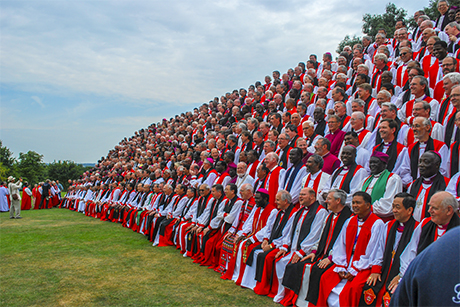Today’s hymn from Sing Praise is “Lord of the Church, we pray for our renewing” by Timothy Dudley-Smith. As the first line suggests, it’s a corporate hymn that seems more meaningful when sung by a church congregation (perhaps especially at an ecumenical gathering) rather than by an individual. Some of the hymns we’ve sung in the ‘ministry and mission’ section have been more individual (such as “I the Lord of sea and sky”) and it’s good to balance these with the corporate ones.
In its three verses, each beginning “Lord of the Church”, we ask Christ (for it is He) for our renewing, blessing and uniting. The first two verses also mention the Holy Spirit, who we ask to “burn for our enduing*, fan the living flame” and fill us. The three requests of uniting, blessing and renewing belong together: where the church is not united in faith and action, it cannot expect to receive the fulness of Christ’s blessing, nor of the Spirit’s renewal.
The words do acknowledge the difficulties we have in this area: “we turn to Christ amid our fears and failings, the will that lacks the courage to be free, the weary labours all but unavailing… from our restless striving”. Instead we ask to be “brought nearer [to] what a church should be” and to be led by Christ until “one Church triumphant one new song shall sing”. That will only be fully accomplished in the life to come, but we must still strive towards it, with his help.
The suggested tune, and I can’t imagine the author had any other in mind, is the one variously known as the [London]Derry Air, or Danny Boy. Its long lines don’t make for easy singing unless you know it well, and the folk tune covers quite a wide range, but I find it comfortably fits my tenor range, and I enjoyed singing this hymn.
* Just as an aside: John transcribed and sang this as “burn for our enduring”, which may make some sense, but “enduing” is how it is printed in this book and elsewhere. An archaic verb, but defined as “to invest or endow with some gift, quality, or faculty”. So we are asking the Spirit here to endow us with his gifts, which makes more sense. An even older definition of “endue” apparently is “’induct into an ecclesiastical living” but I don’t think the author here expects everyone to pray to become an Anglican vicar!
